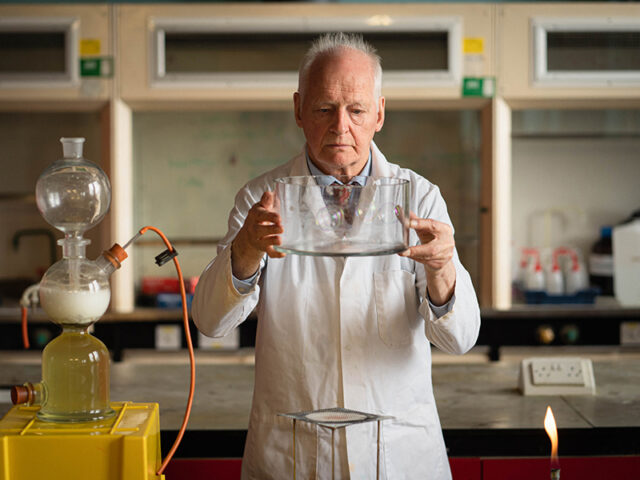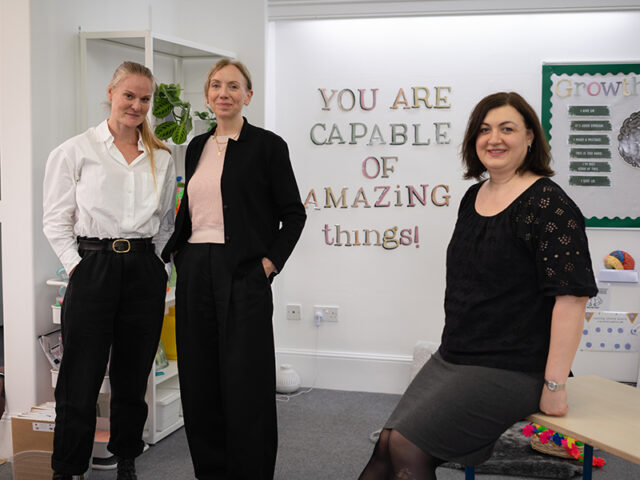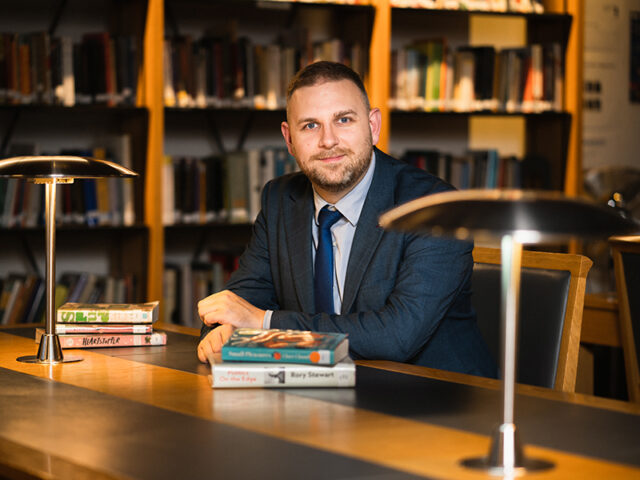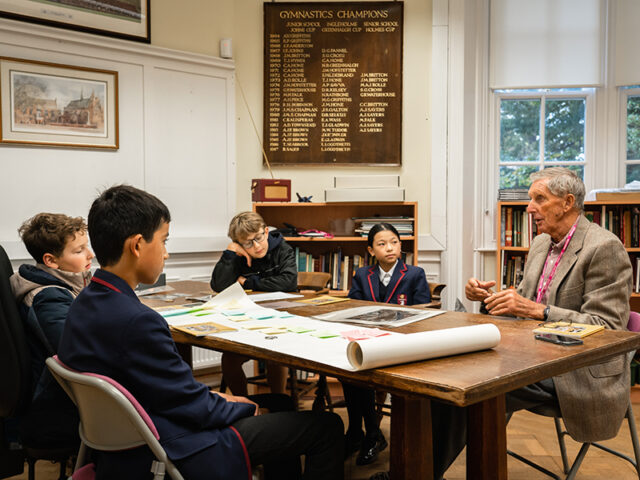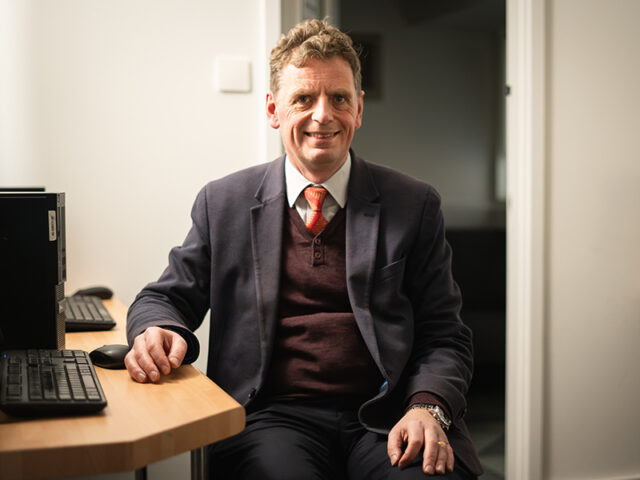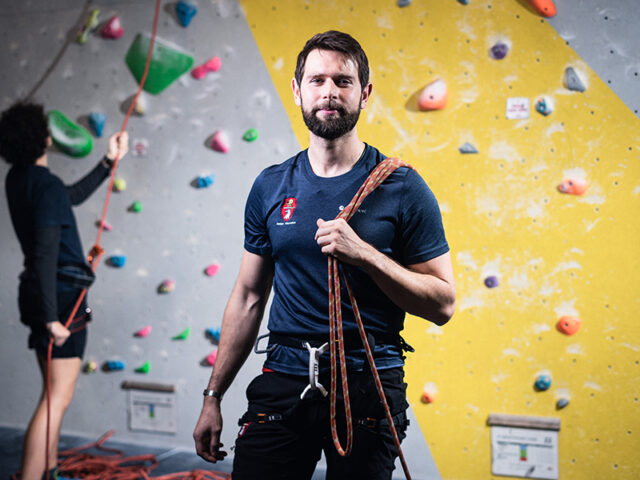Every Tuesday lunchtime, students from Y9 to Y13 meet at Masaryk Society to discuss topics relating to politics, current affairs or broader themes and issues linked to other disciplines such as economics, for example. It’s a lively forum and, for many, their main opportunity to engage with politics before it officially appears in the curriculum.
Dating back to 1943, the society was named after the political philosopher and founding president of the Czechoslovak Republic, Tomáš Garrigue Masaryk. The school magazine reports on the inaugural session, at which his son, Jan Masaryk, the Czechoslovakian Deputy Prime Minister, visited to speak about his father and shared accounts of his integrity and fearlessness.
The club fell dormant in the early 70s, and was revived nearly 40 years later in 2010. In the spirit of its namesake, the society promotes the importance of open political discourse and develops skills in discussion, reflection, thoughtful questioning, and the articulation of ideas.
The society has always been student led, chaired by a handful of Y13s who take turns to choose topics and lead the lunchtime sessions. Pupils present on a topic of their choice for about 10-15 minutes followed by questions from the audience. Whilst there is always a member of staff supervising, we encourage the pupils to take ownership of the society and the student leaders frequently invite presentations from students in other year groups on a wide variety of topics.
I think it’s important that we have something available to pupils in Y9-11 so that they get some exposure to politics at an early stage. Since there is no opportunity to study Politics in depth before Y12, the Masaryk Society is an important way for students to explore their political interests and may help them decide whether they would like to study Politics later on. It also gives them a chance to discuss their views in a forum that isn’t just them and their friends, or an online app. As a society that attracts pupils with a range of different views, there are always likely to be people in the room who might not know you or might not agree with you. This means students can get used to the norms that help keep a discussion on track and can practice articulating their views.
In this sense, my hope is that Masaryk Society gives pupils a chance to exercise and develop the kinds of academic virtues that we’re trying to cultivate at Highgate, such as defending your position in a way that is sincere and presenting challenges in good faith, with the aim of reaching common understanding. Pupils learn the importance of calibrating their position against the strength of the evidence and arguments in favour. Needless provocations are discouraged since these inevitably generate more heat than light.
Rather than being an arena for formal competitive debating, which has a focus on point scoring, Masaryk Society is about discussing issues and current affairs as a collaborative enterprise. Formal debating is an activity our pupils enjoy and excel at, but this is catered for elsewhere in our co-curricular programme, through the Junior and Senior Debating Clubs.
Some of the recent topics Masaryk has focused on include wokeness and cancel culture, the crisis in the Democratic Republic of Congo, the King’s Speech and the current state of the Conservative Party. In the past we have also had discussions on notable Supreme Court rulings, the arguments for a Land Tax, the death penalty, and the Climate Crisis.
I think the atmosphere at Masaryk has changed over the years and it’s much more about mutual respect and trying to understand difference, even if they can’t arrive at a point of shared agreement and understanding, the difference is just as important sometimes.
Inevitably, there are the occasions where pupils may occasionally feel upset by the discussion, not because of any intention on behalf of the speakers, but simply because a topic has been so emotive. Whilst we will always follow up with any affected pupils, I hope the society encourages the notion that you can disagree with somebody and remain friends. You don’t necessarily need to turn off your emotions, but you don’t have to be cross.
Being an audience participant is also an educational experience. How do you react as a member of the audience when you hear something that you don’t agree with, or you don’t like? The sixth formers and staff who attend do a fantastic job of modelling the merits of discussion, reflection, ideas, and questioning.
For students in Y12-13, Masaryk is a great way to build confidence and get experience speaking in front of a group. Occasionally, the student leaders will reach out beyond the school to invite guest speakers to attend. We’ve been lucky to welcome journalist Nick Robinson, former Senator Russ Feingold and former speaker of the House of Commons, John Bercow. As per the nature of the society, we always look to present a range of perspectives from across the political spectrum. Last week, Sarah Sackman (Labour candidate for Finchley and Golders Green) visited to speak on why it’s so important for young people to be engaged in politics.

Occasionally, staff will present at Masaryk. The last one I did was arranged as a debate on the legal merits of the ruling in Dobbs v Jackson. It’s a topic that we cover at A Level, so provides a great opportunity for pupils in Y11 to hear about it and get a sense of what to expect in the Sixth Form if they choose Politics as one of their options.
As the Head of Politics and the member of staff in charge of supervising Masaryk, I always look forward to hearing student presentations on Tuesday lunchtimes. It is a testament to the curiosity and confidence of the students here that we have such high-quality presentations on a weekly basis. After half term, leadership of the society will transition from the current Y13 student leaders to the new Y12s. Each group of students that leads Masaryk Society has its own particular focus, style and character. I look forward to seeing how the new Y12 leaders take the Society forward.
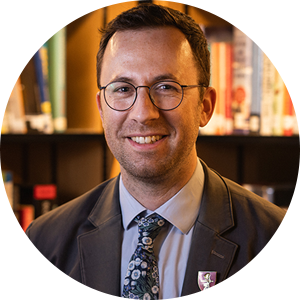 About the author Jack Reilly, Head of Politics and Teacher of Economics Jack joined Highgate in 2017 and became Head of Politics in 2019. He is a Y12 tutor and accompanies the Duke of Edinburgh expeditions to Snowdonia and the Lake District each year. Jack enjoys running, cycling, camping in remote places and travelling.
About the author Jack Reilly, Head of Politics and Teacher of Economics Jack joined Highgate in 2017 and became Head of Politics in 2019. He is a Y12 tutor and accompanies the Duke of Edinburgh expeditions to Snowdonia and the Lake District each year. Jack enjoys running, cycling, camping in remote places and travelling.